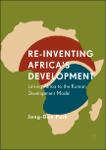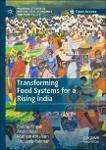Search
Author
- Tetsushi, Sonobe (2)
- Anaka, Aiyar (1)
- Andaleeb, Rahman (1)
- Jong-Dae, Park (1)
- next >
Subject
- Economics (7)
- Economic policy (5)
- kinh tế (5)
- Development economics (4)
- next >
Date issued
Has File(s)
- true (7)
Search Results
This open access book asks why and how some of the developing countries have “emerged” under a set of similar global conditions, what led individual countries to choose the particular paths that led to their “emergence,” and what challenges confront them. If we are to understand the nature of major risks and uncertainties in the world, we must look squarely at the political and economic dynamics of emerging states, such as China, India, Brazil, Russia, and ASEAN countries. Their rapid economic development has changed the distribution of wealth and power in the world. Yet many of them have middle income status. To global governance issues, they tend to adopt approaches that differ from those of advanced industrialized democracies. At home, rapid economic growth and social changes put... |
This open access book explores the most recent trends in the EU in terms of development, progress, and performance. Ten years after the 2008 economic crisis, and amidst a digital revolution that is intensifying the development race, the European Union, and especially Central and Eastern Europe, are ardently searching for their development priorities. Against this background, by relying on a cross-national perspective, the authors reflect upon the developmental challenges of the moment, such as sustainable development, reducing inequality, ensuring social cohesion, and driving the digital revolution. They particularly focus on the relation between the less-developed Eastern part of the EU and its more developed Western counterpart, and discuss the consequences of this development gap... |
At present, how to develop industries is a burning issue in Africa, where population growth remains high and economic development has thus far failed to provide sufficient jobs for many, especially young people and women. The creation of productive jobs through industrial development ought to be a central issue in steering economic activity across the continent. The authors of this book, consisting of two development economists and five practitioners, argue that the adoption of Kaizen management practices, which originated in Japan and have become widely used by manufacturers in advanced and emerging economies, is decisively the most effective first step for industrial development in Africa. This open access book discusses what Kaizen management is, why it is applicable to Africa, a... |
This open access book analyses the development problems of sub-Sahara Africa (SSA) from the eyes of a Korean diplomat with knowledge of the economic growth Korea has experienced in recent decades. The author argues that Africa's development challenges are not due to a lack of resources but a lack of management, presenting an alternative to the traditional view that Africa's problems are caused by a lack of leadership. In exploring an approach based on mind-set and nation-building, rather than unity – which tends to promote individual or party interests rather than the broader country or national interests – the author suggests new solutions for SSA's economic growth, inspired by Korea's successful economic growth model much of which is focused on industrialisation. This book will be... |
This open access book belongs to the Maritime Business and Economic History strand of the Palgrave Studies in Maritime Economics book series. This volume highlights the contribution of the shipping industry to the transformations in business and society of the postwar era. Shipping was both an example and an engine of globalization and structural change. In turn, the industry experienced and pioneered, mirrored and enabled key developments that led to the present-day globalized economy. Contributions address issues such as the macro-level shift of shipping’s centre of gravity from Europe to Asia, the political and legal frameworks within which it developed, the strategies and performance of both successful and unsuccessful firms, and the links between the shipping industry and the w... |
This book is open access under a CC BY-NC-ND license. This volume analyzes the economic, social, and political challenges that emerging states confront today. Notwithstanding the growing importance of the ‘emerging states’ in global affairs and governance, many problems requiring immediate solutions have emerged at home largely as a consequence of the rapid economic development and associated sociopolitical changes. The middle-income trap is a major economic challenge faced by emerging states. This volume regards interest coordination for technological upgrading as crucial to avoid the trap and examines how various emerging states are grappling with this challenge by fostering public-private cooperation, voluntary associations of market players, and/or social networks. Social dispar... |
This open access book examines the interactions between India’s economic development, agricultural production, and nutrition through the lens of a “Food Systems Approach (FSA).” The Indian growth story is a paradoxical one. Despite economic progress over the past two decades, regional inequality, food insecurity and malnutrition problems persist. Simultaneously, recent trends in obesity along with micro-nutrient deficiency portend to a future public health crisis. This book explores various challenges and opportunities to achieve a nutrition-secure future through diversified production systems, improved health and hygiene environment and greater individual capability to access a balanced diet contributing to an increase in overall productivity. The authors bring together the latest ... |







